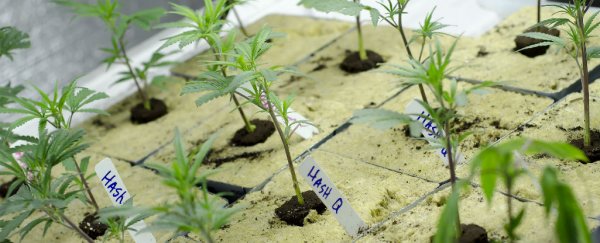Yeast has been engineered to produce the main psychoactive compound in marijuana - tetrahydrocannabinol (THC). Responsible for the majority of marijuana's psychological effects - including the high - THC can also be use to treat symptoms of HIV infection and chemotherapy and researchers are hoping their yeast will be able to pump it out more efficiently than producing synthetic versions.
"This is something that could literally change the lives of millions of people," Kevin Chen from Hyasynth Bio, a Canada-based company that's been engineering yeasts to produce both THC and cannabidiol - another active compound that has shown promise as a medical treatment - told The New York Times.
Back in August, researchers from the University of California, Berkeley in the US announced that they'd figured out how to make 'home-made' heroin using a modified form of sugar-fed yeast and an enzyme extracted from poppies. They discovered that a certain type of enzyme can turn glucose sugars into morphine, and were able to successfully express it in a simple form of genetically engineered yeast.
Now, researchers from the Technical University of Dortmund in Germany have outlined in the journal Biotechnology Letters how they looked into which genes the marijuana plant uses to produce THC, and then engineered those genes into their yeast. They then fed a cocktail of specially chosen molecules to the yeast, and it essentially 'poops' out the THC.
They've also reportedly managed to produce cannabidiol in the same way, but are yet to publish the details. The big challenge now will be figuring out how to replace these molecules with a raw material such as sugar to make the process cheap, easy, and commercially competitive.
The purpose isn't to replace the marijuana plant, because let's face it, it's doing a pretty good job on its own. As Jonathan Page, an adjunct professor at the University of British Columbia in Canada who helped sequence the THC and cannabidiol genes, told Roxanne Khamsi at The New York Times: "Right now, we have a plant that is essentially the Ferrari of the plant world when it comes to producing the chemical of interest. Cannabis is hard to beat."
The idea instead is to offer up an alternative for places such as Europe, where medicinal compounds from marijuana would be welcomed if they didn't come in the form of a plant that could be illegally farmed. And synthetic versions of THC are currently available in pill form to treat several side effects of having HIV or chemotherapy, but the chemical synthesis involved is complicated and expensive.
What yeast could also offer is the potential to more efficiently test the medicinal properties of specific active compounds in marijuana, which have shown promise in treating everything from seizures and inflammation to cancer and parkinson's disease. Yasmin Hurd, a professor of neuroscience and psychiatry at Icahn School of Medicine at Mount Sinai, told Tech Insider that using all the compounds in marijuana simultaneously is like "throwing 400 tablets in a cocktail and saying 'take this,'" rather than figuring out which component of that cocktail is really beneficial for the specific disease.
Because right now, rigorous scientific evidence showing that marijuana and its constituents effectively treat the symptoms of many of the illnesses for which they've been prescribed is lacking.
"Marijuana is increasingly embraced as medicine, yet there is limited evidence that it is effective against many of the conditions for which it is prescribed," The New York Times reports. "Researchers hoping to separate fact from wishful thinking will need much better access to marijuana's unique constituents. Modified yeast may provide them."
